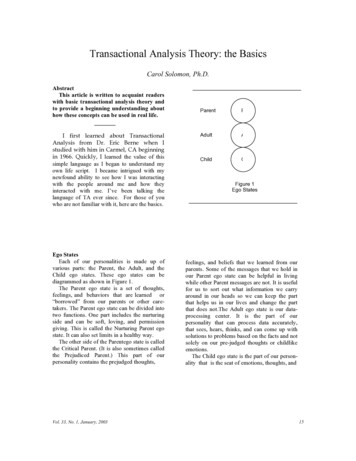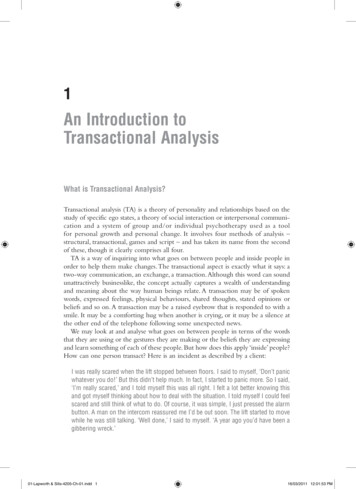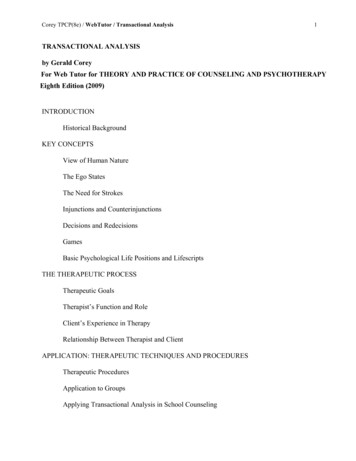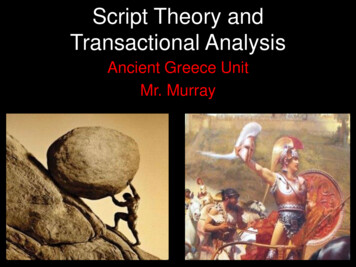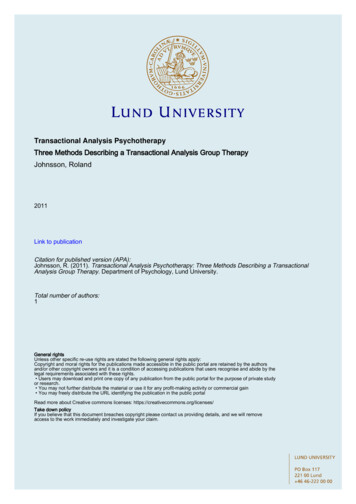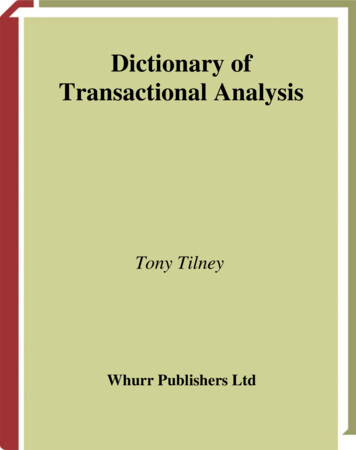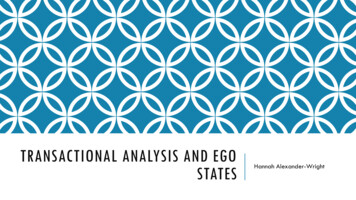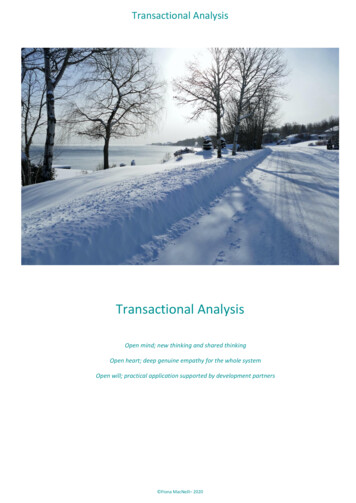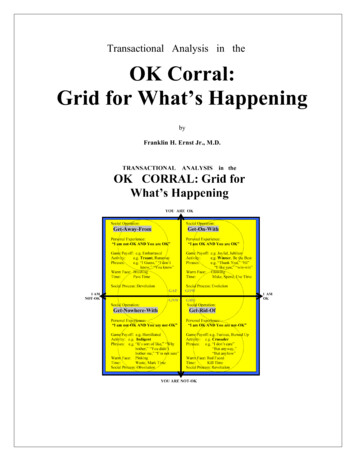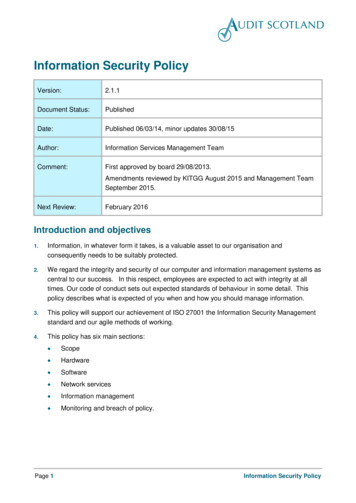
Transcription
TRANSACTIONAL ANALYSIS
AIMS OF SESSIONA bit of theory about TA – ego statesSome examples from the groupSome more theory – transactions and strokesExamplesA bit more theory – games people play with examples and suggestions about how tointerrupt play ( unless it is mutually enjoyable)
TA is a theory of personality and a systematic psychotherapy forpersonal growth and personal change.Developed by Eric Berne in 1960sPhilosophy of TA People are OK ( have worth value dignity as human beings)Everyone has the capacity to thinkPeople decide their own destiny and these decisions can bechanged.Uses:Understanding others and ourselves.Trying to make sense of some interactions.Therapy
KEY IDEASEgo-state PAC model Behaving thinking and feeling in ways that are acopy of my parents or other parent like figures Behaving thinking and feeling in response to what isgoing on around me here and now using all theresources available to me as a grow up person Returning to ways of behaving thinking and feelingthat I used when I was a child
Controlling ParentConstructiveOrganisingFirm - PositiveAutocratic FaultfindingDismissive - negativeNurturing ParentPARENTBehaving thinking andfeeling in ways thatare a copy of myparents or otherparent like figuresSupportive,compassionate,caring – positiveSmothering overprotective – negativeADULTThinking, here andnow, rational.Adapted childAccommodation, cooperative- positiveFearful rebellious –negativeFree childCHILDReturning to ways ofbehaving thinking andfeeling that I usedwhen I was a childCreative, curious,playful – positiveEgocentric, wild,inconsiderate –negative
TRANSACTIONS – parent / adult / childWe converse with each other in Transactions.TA is the use of the ego-state model to analyse sequences of transactions. What do you think? You must stop smoking / drinking. You have only yourself to blame. You look unwell. Let me help. Don’t worry. You have tried your best. Poor you. What are the choices? How can we move forward from here? How can I help you today? That sounds great Sorry I am late. I want that one please. I can’t do that so there. I pay my taxes why can’t I have an antibiotic. So what.
For a healthy balanced personality we need all 3 ego states.The one we play most often is our predominant ego state.Two individuals who come together might interact well orbadly depending on which ego state each one is in. The mostsuccessful transactions happen when both are in Adult.
DOES IT MATTER? Being a controlling parent (paternalistic doctor?) can get the other person into achild state where they may conform but may risk they will be an adaptive childand rebel. Behaving like a child can trigger a parent response – negative or positive. Being a nurturing parent can create trust but also dependency. TA can help us to look at consultations, teaching etc. by focussing on the egostate that we are in. If we (the doctor/ teacher) can change our ego state we caninfluence which ego the patient decides to play. TA emphasise our ability to become aware of decisions that govern ourbehaviour and the capacity to make new decisions that will beneficially alter thecourse of our life. TA can be particularly useful for looking at difficult consultations / discussions. Adults make choices and can choose to change.
The Need for Stokes.A stroke is a unit of recognition, when one person recognizes another person either verballyor non verbally.Humans need to be stimulated physically socially and intellectually. The need for stimulation is referred to as“strokes”A basic premise of TA approach is that humans need to receive both physical and psychological strokes todevelop a sense of trust in the world and a basis for loving themselves.Conditional / unconditional – positive / negative.
Communications (transactions)When two people communicate each exchange a transaction. Many of our problems come fromtransactions which are unsuccessful.At the core of Berne’s theory is the rule that effective transactions must be complementary.Most effective transactions are likely to be adult to adult.TA suggests that one of the overriding factors in difficult situations is not the other person’s behaviour butour own state of mind.
Crossed transactions lead toineffective communication or cancause upset. E.G. Do you know where my keys are? (adult to adult) You are always blaming me for (Cto A) or why don’t you ever put thingsaway (P to C) They are on the table (A to A) When a transaction iscrossed a break in communicationresults and one or both individuals willneed to shift ego-states in order forcommunication to be re-established.
Can you remember a situation where each time you meet a particular person you find yourselfrepeating the same uncomfortable or destructive patterns every time you meet them?For example:You are never able to say no.Constantly feeling pushed into doing things for someone.They make you feel defensive.You feel they are always critical of you.You feel relegated to being the listener and there is never an interest in what is happening toyou.Each time you may think :Never againNext time will be differentTA suggests one of the overriding factors in these situations is not the other person’s behaviourbut our own state of mind.
GAMES PEOPLE PLAY Recurring set of transactionssuperficially plausible with aconcealed motivation.Split transactions. Surfaceappearance is not what is reallygoing on (A A on surface butmight by C P at psychologicallevel)Exchange of strokes between twoor more people. Why play games? Need for strokes – positive ornegative. Meets a mutual need Common payoff is support for thestatus quo and to justify not makingchanges. Affirming life position. ( OK or notOK)
WHY DON’T YOU .YES BUT I don’t know what to do with this patient with .I want to stop smoking doctor . Yes but You’re a great help Pay off – A feels superior Why don’t you B feels sense of failure, inadequate– switched to Child
GAME THEORYCon ( eg asks for help, the hook) In TA Gimmick is the need inourselves that makes us respond ortake the hook. This could be a need for approval,need to be parent, need to appearin a particular way Gimmick Response Switch Cross-up(realisation) PAYOFF (I win you loose)
HOW TO BREAK THE PATTERN OF GAMEPLAYING.Could figure out the other personsneed and deprive them of this but thisis difficult. The person themselves maynot be aware they are playing or why.Figure out what in ourselves hooks usinto the game. What are ourgimmicks?This could be a need to feel helpful (or nice, caring, strong, perfect,personable, the winner etc)To be seen to be .To make others feel grateful for Remember the game cannotproceed if you choose not to play.
Dealing with GamesBeforeFamiliarise yourself with the structure of the games you play – how do they start,who starts, how does it end .What needs in yourself hook you into playing?Starting- look out for discounts – statements that distract or deny some kind ofreality e.g. that paper is rubbish.DuringSlippery feelingShare awarenessRespond from ADULTRespond in a different state from the one the game seems to invite.Unplug
GAMES – SOME EXAMPLES Nothing you ever do for me worksdoctor “Mine is better than yours” Kick me / Poor me - Played bypeople who have decided they arehelpless. Why don’t you ---- yes but e.g. get ajob – childcare, skills, not wellenough. If it weren’t for you I could . I’m only trying to help .There’snothing you can do to help me or Seehow hard I’ve tried Look what you made me do You can’t make me
References:Games People Play – Eric BerneISBN 978-0-141-04027-1I’m ok – You’re OK – Thomas A HarrisISBN 978-0-09-955755-5T A Today – Ian Stewart and Vann JonesISBN978-1-870244-02-2YouTube – Lots of resources but I found these very straightforward.https://www.youtube.com/watch?v nKNyFSLJy6oTransactional Analysis 1: ego states & basic transactionshttps://www.youtube.com/watch?v YOqJ4sc9TAcTransactional Analysis 2: gameshttps://www.youtube.com/watch?v 58F2qYyAzMETransactional Analysis 3: gimmicks
Transactional Analysis 3: gimmicks . Title: Transactional Analysis Author: Marie Created Date: 5/23/2018 10:22:02 AM .
